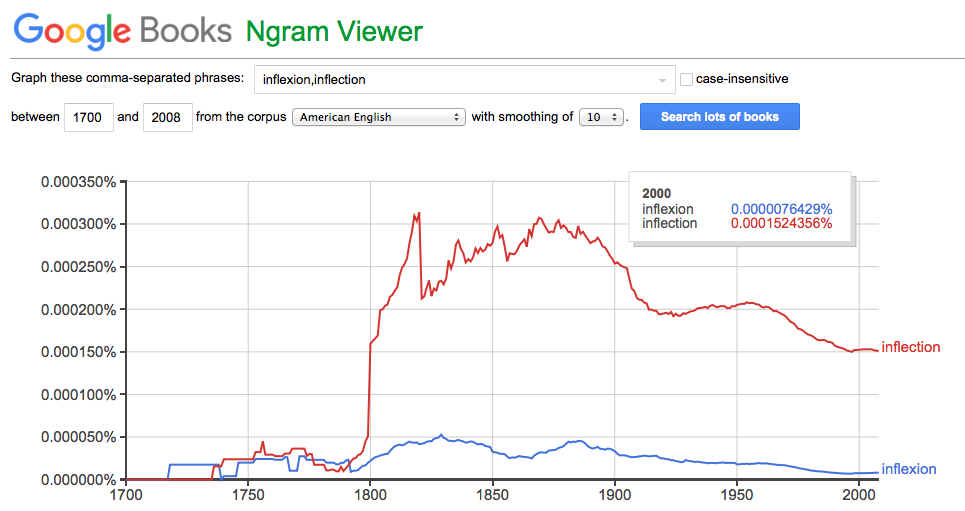Considering that Webster published his first dictionary in 1806, is there a recognised tipping point (year, decade, etc.) that marked the move from traditional British spelling to Webster's American? Was this shift a gradual but chaotic process or was it a deliberate and possibly collective decision taken by the educational institutions, the media, or the government of the time? In other words, how did the shift come about?
-
2Superseding is not the right word. These things are gradual processes.– LambieCommented Feb 5, 2017 at 18:28
-
@Lambie So, overtake, then?– NVZ ♦Commented Feb 5, 2017 at 18:30
-
1@Lambie why not superseded! Some things supersede gradually.– NVZ ♦Commented Feb 5, 2017 at 18:34
-
@NVZ I just don't think spelling systems supersede (replace or supplant) each other. [subsede?? not a word, I shouldn't think]. Gradually is the key word for me. Gradually supercede, I'd accept.– LambieCommented Feb 5, 2017 at 20:32
4 Answers
The answers to your questions are:
- Yes, the shift was and continues to be a gradual and chaotic process.
- No, there was not a a deliberate and possibly collective decision taken by the educational institutions, the media, or the government of the time.
Yes, there were a few changes that Webster tried, but the history of English spelling is much, much, much more complicated than that. English has never had a single agreed-upon spelling, even within any one country. There is no such thing as the American spelling, nor for that matter is there the British spelling, when discussing the English language. At most, there are individual words that may show a general predilection, but that shifts over time and within writers and publishers. It isn’t a simple us-vs-them situation almost in any pairing. There is too much historical variation.
Here is a summary of my findings below sorted by year:
always inflection, inflexion
always paralyzed, paralysed
always tire, tyre
1680 surprize, surprise
1770 surprise, surprize
1810 jewelry, jewellery
1835 colored, coloured
1835 deputize, deputise
1845 armor, armour
1845 connection, connexion
1905 aluminum, aluminium
1905 woolen, woollen
1910 esophagus, oesophagus
1910 fetus, foetus
1915 leveled, levelled
1920 center, centre
1930 savior, saviour
1940 miter, mitre
1940 specter, spectre
1970 acknowledgment, acknowledgement
1975 theater, theatre
1980 scepter, sceptre
never ameba, amoeba
never glamor, glamour
There is a lot more variation than even that summary shows; please see the more detailed charts below, including some that go the other way by showing British usage. Each of these really is a separate case, and must be considered individually. There is no single, solitary, discrete, and agreed-upon thing called American spelling versus British spelling. There is a vast continuum of conflicting tendencies, some weaving back and forth time across the Atlantic, and across time. Even when one spelling “supersedes” another, it merely comes out ahead in the popularity contest. It usually does not wholly supplant the former spelling.
For the Ngramaniacs
In all cases, the putative “American” spelling is in blue, and the putative “British” spelling is in red. Notice how the answers are all over the board, and some rather surprising, too.
center vs centre
When did center supersede centre in American English? Answer: Around 1910. Ngram
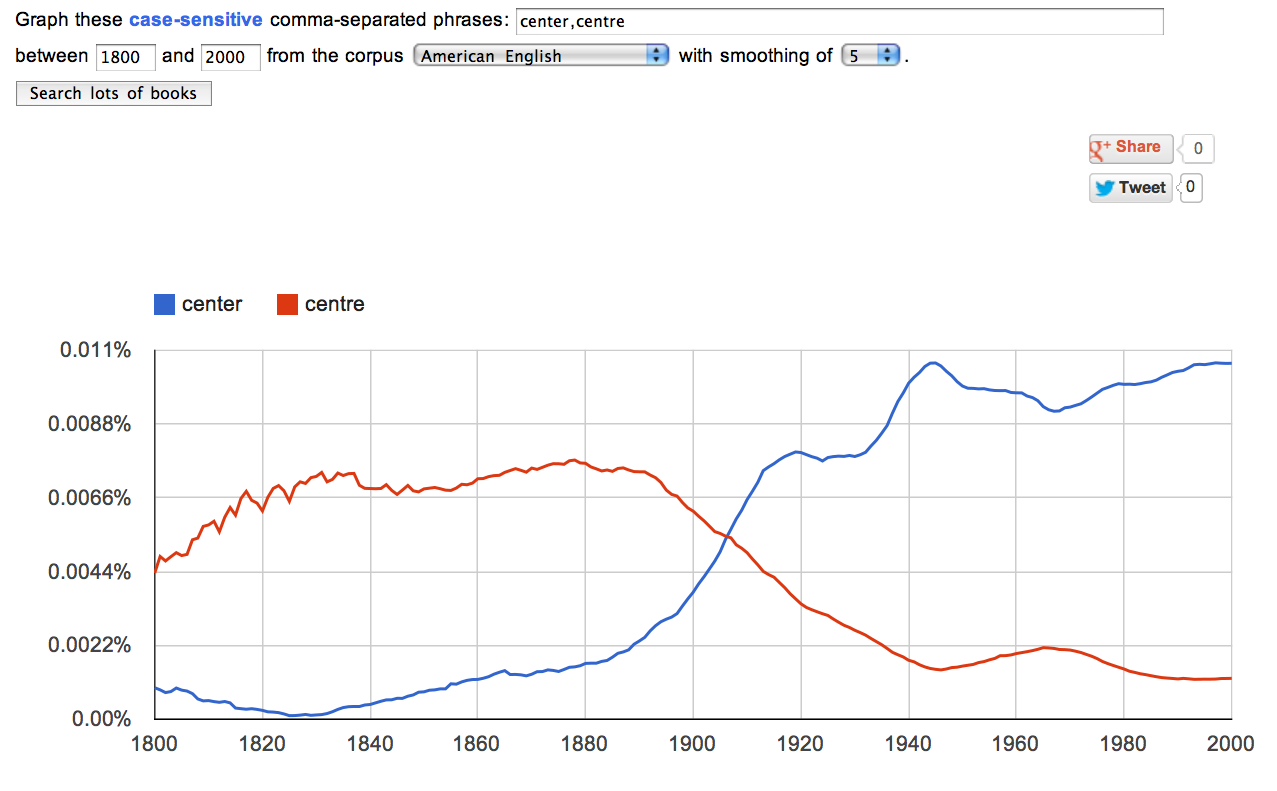
theater vs theatre
When did theater supersede theatre in American English. Answer: During the late 1970s. Ngram
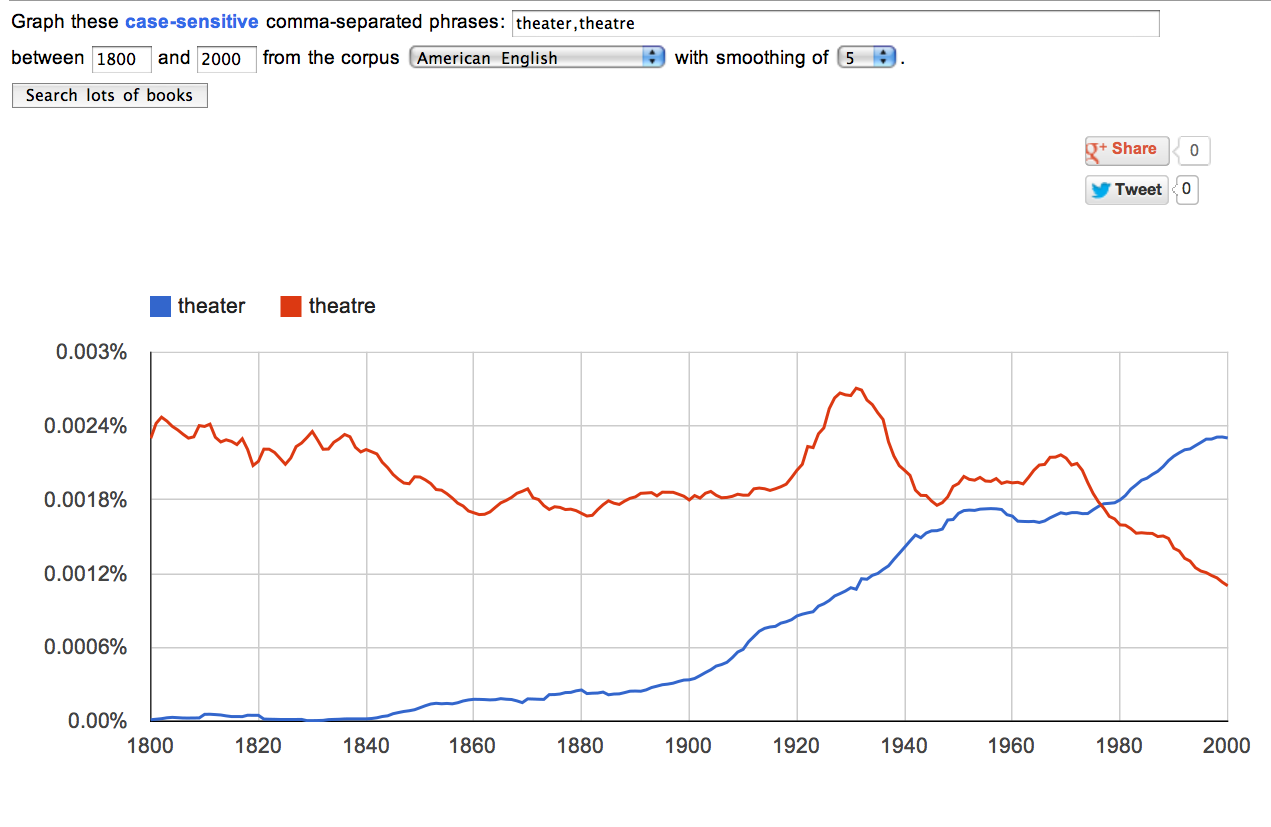
armor vs armour
When did armor supersede armour in American English? Answer: Around 1850. Ngram

glamor vs glamour
When did glamor supersede glamour in American English? Answer: Never, because it has always been a minority usage. Ngram

woolen vs woollen
When did woolen supersede woollen in American English? Answer: around 1905. Ngram
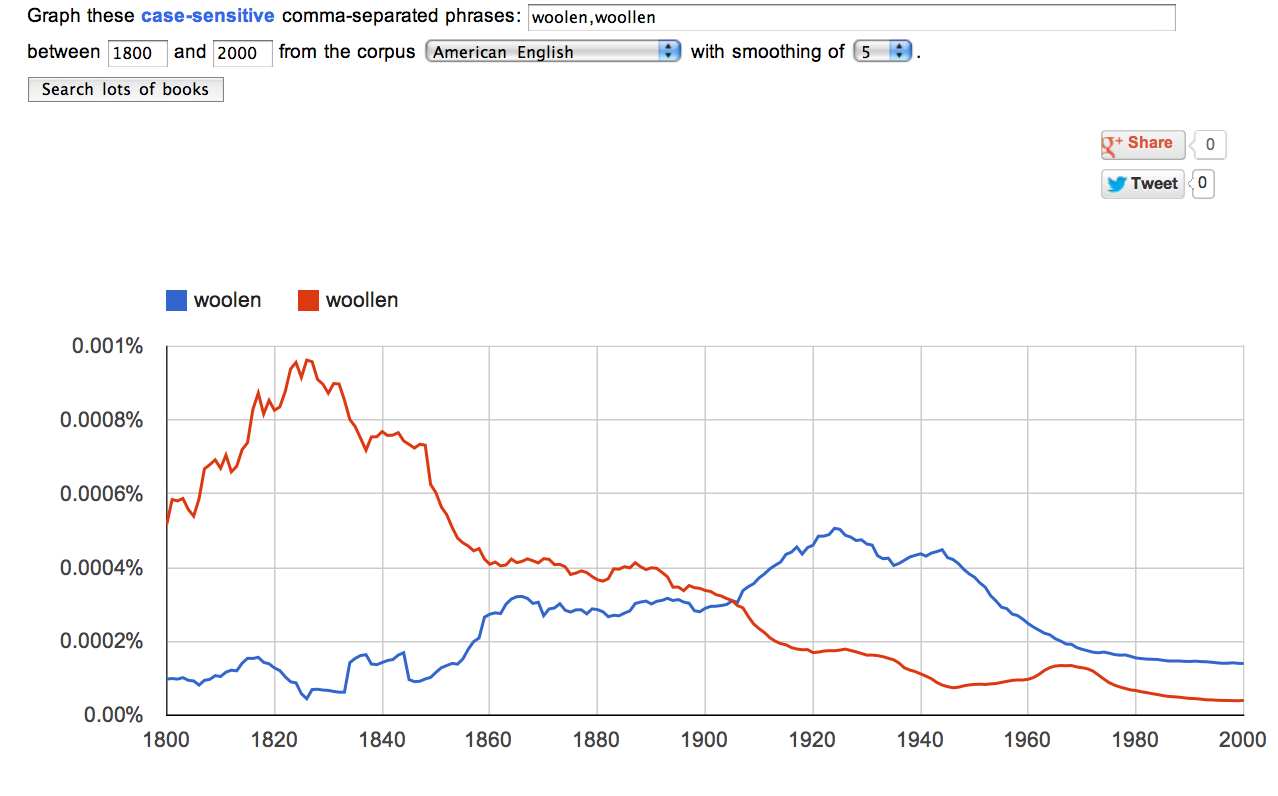
tire vs tyre
When did tire supersede tyre in American English? Answer: Never, because it was always dominant. Ngram
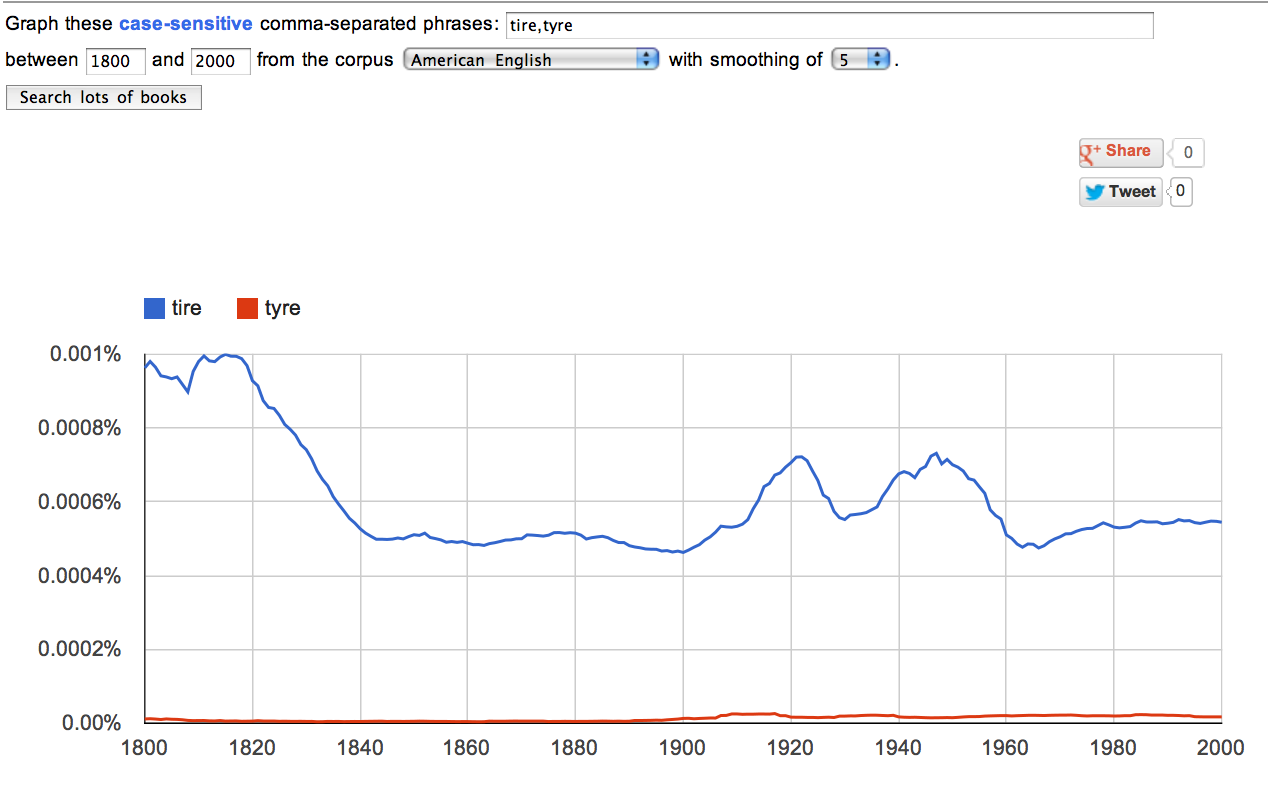
Well, and when did tyre supersede tire in British English? Answer: in the early 1940s. But it only lasted a couple of decades before falling back into minority usage again. Ngram
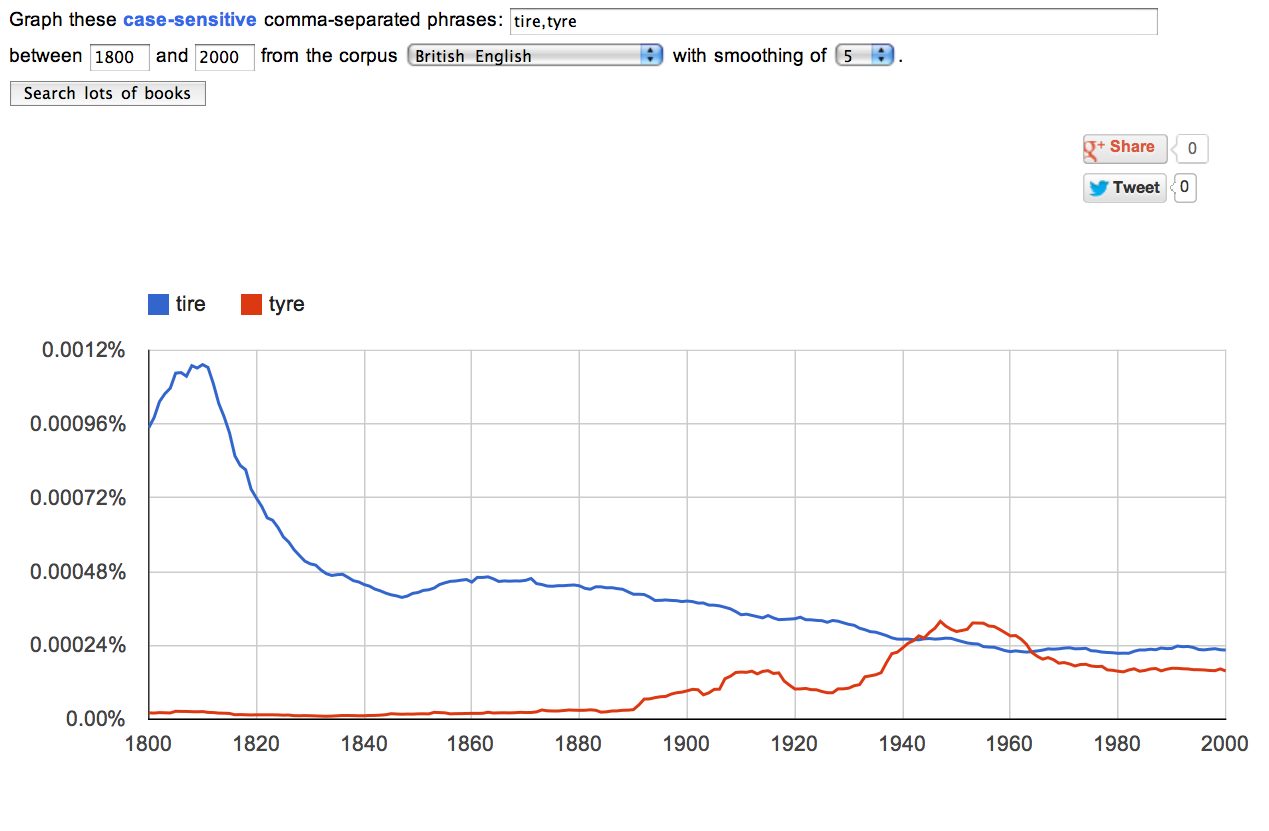
miter vs mitre
When did miter supersede mitre in American English? Answer: Around 1920. Then again around 1940. Then again around 1970. Ngram
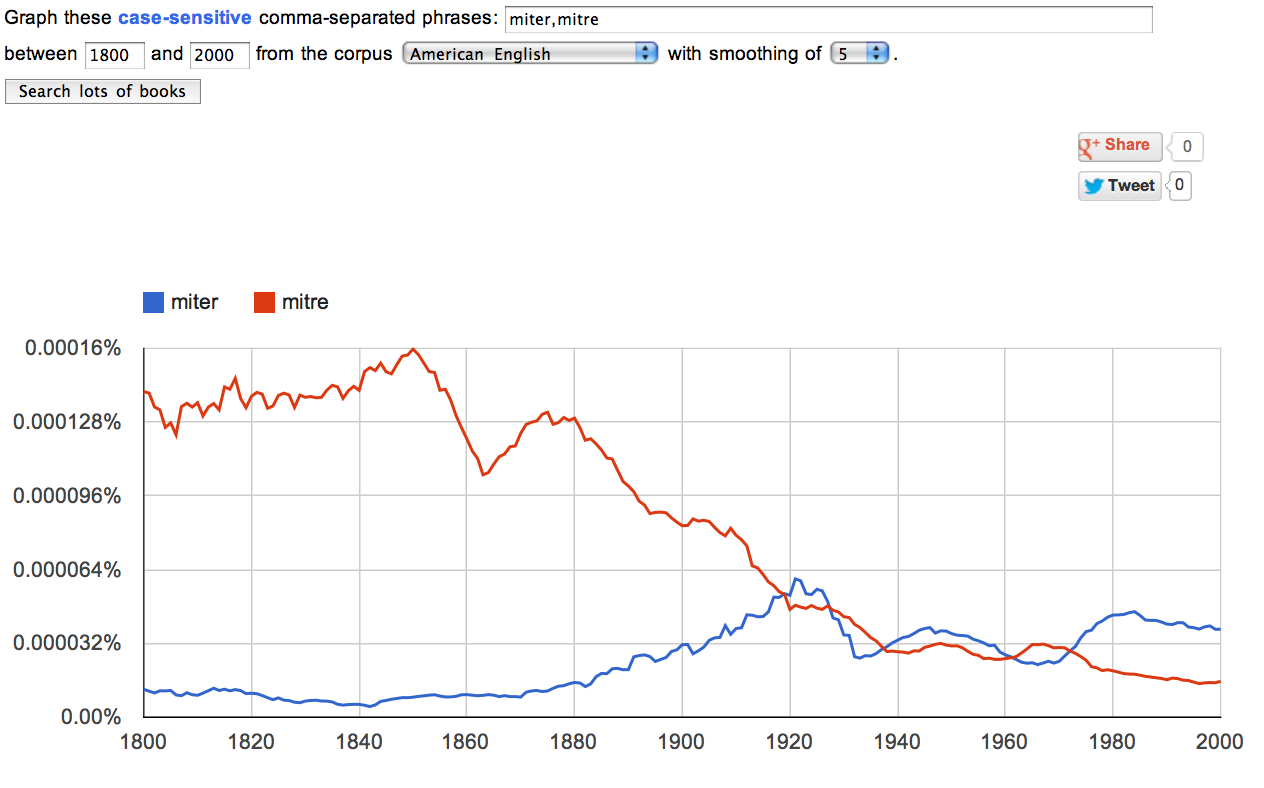
acknowledgment vs acknowledgement
When did acknowledgment supersede acknowledgement in American English? Never. It has always been that way. Ngram
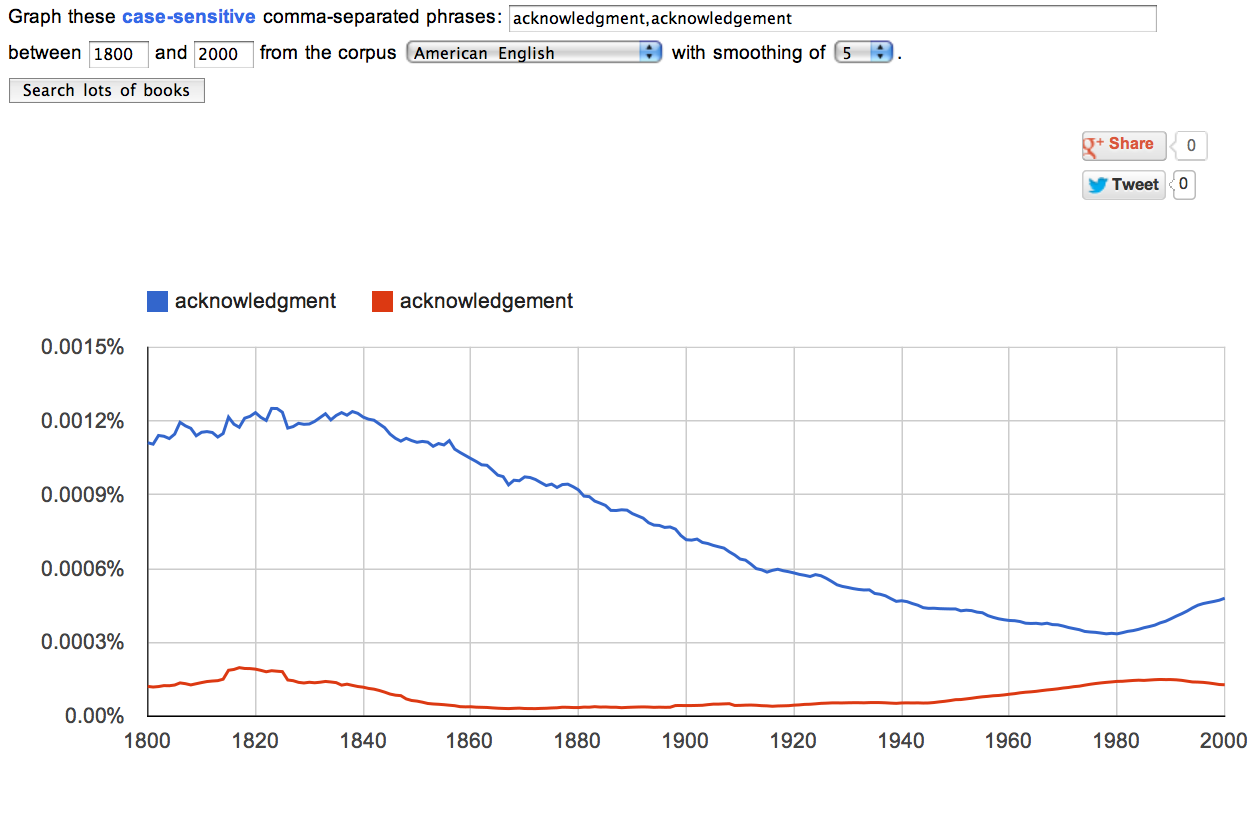
What about the other way around? When did acknowledgement supersede acknowledgment in British English? Answer: Around 1970. Ngram
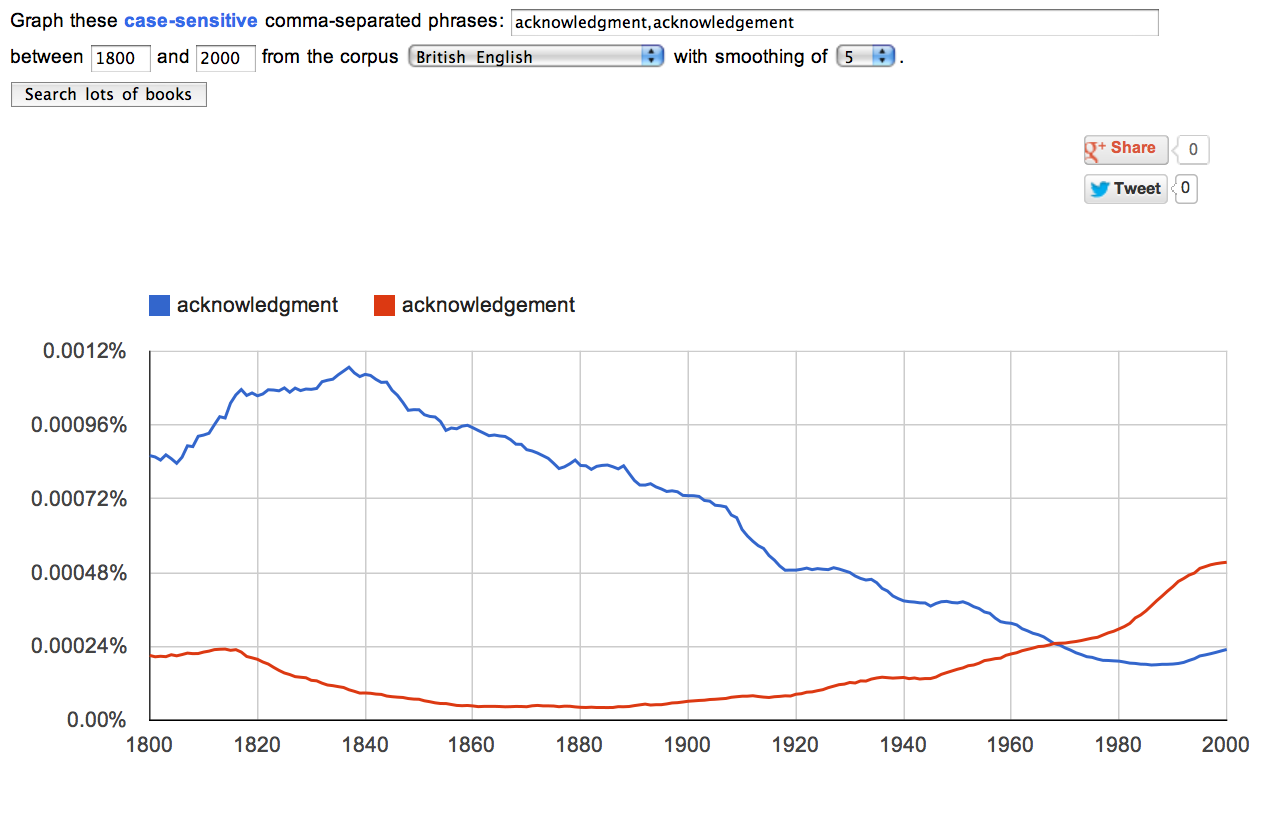
scepter vs sceptre
When did scepter supersede sceptre in American English? Answer: Around 1980. Ngram
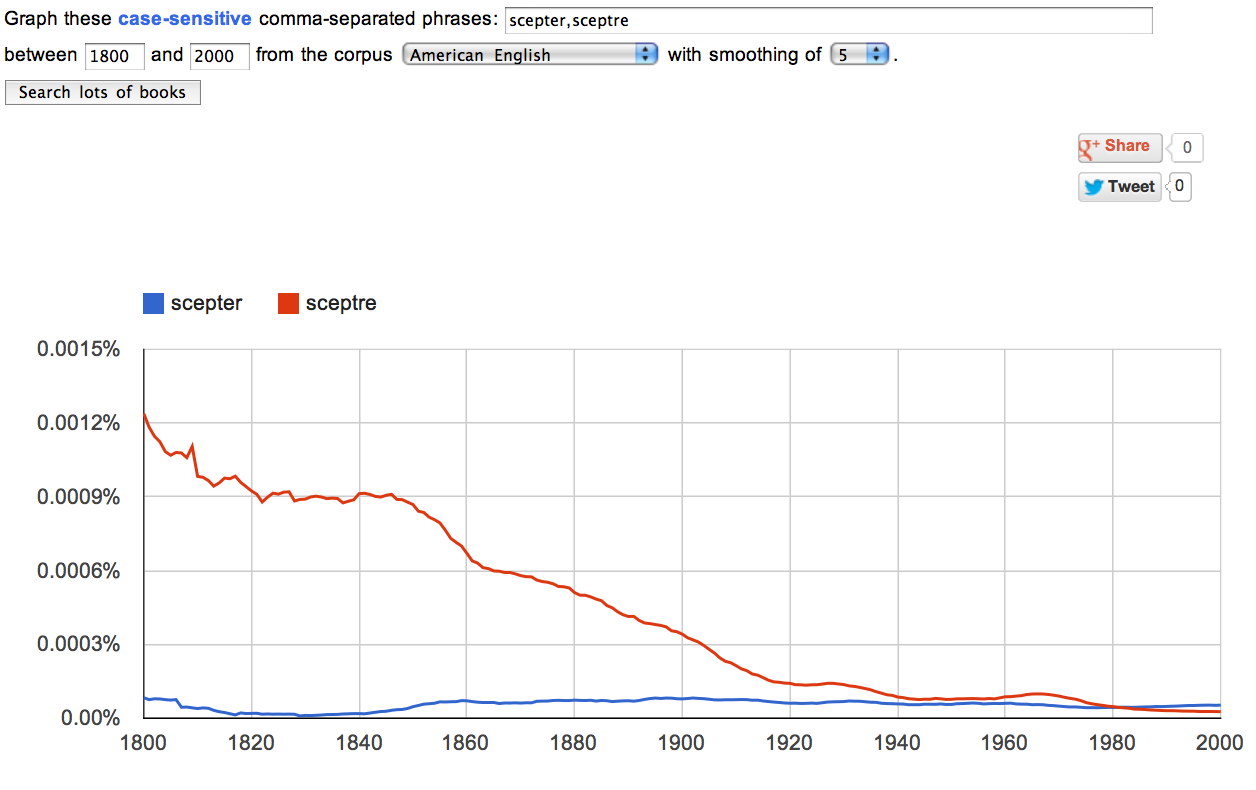
savior vs saviour
When did savior supersede saviour in American English? Answer: Around 1930. Ngram
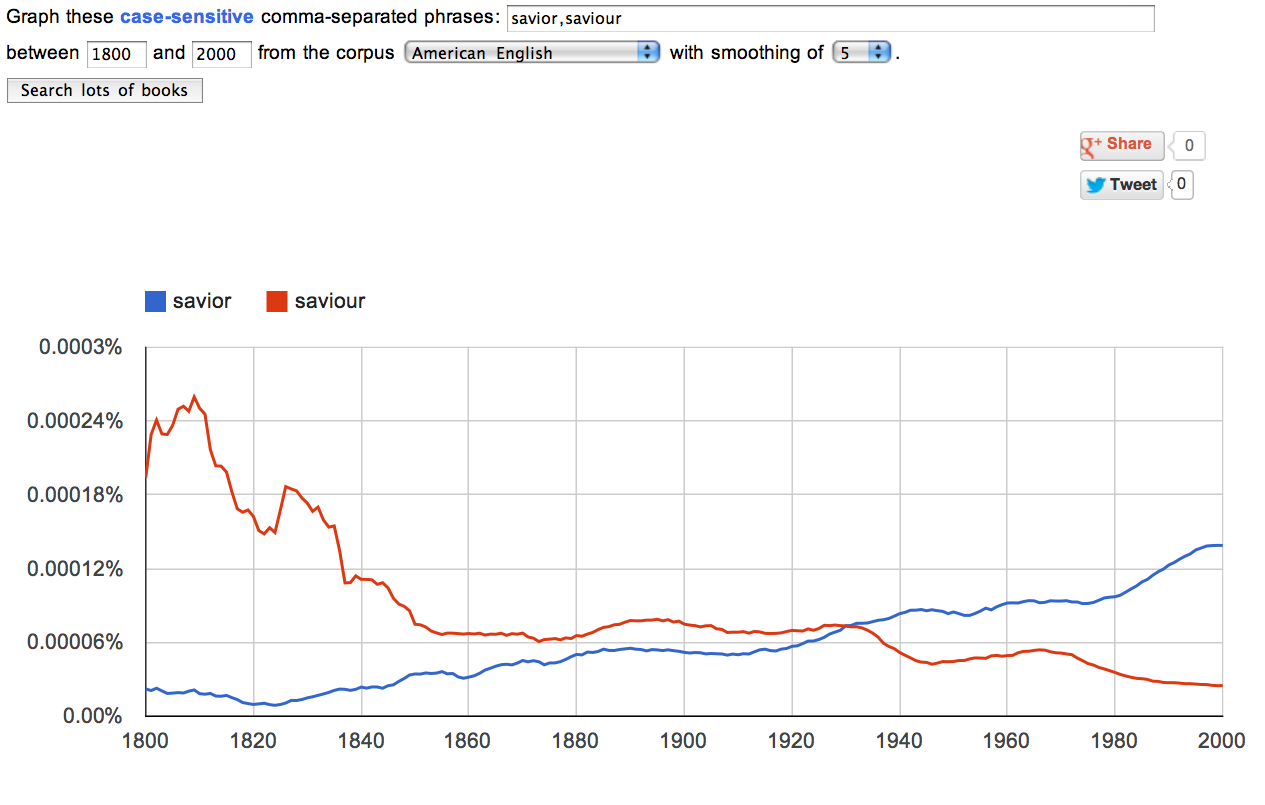
deputize vs deputise
When did deputize supersede deputise in American English? Answer: Around 1810. Ngram

But what about the other way around? When did deputise supersede deputize in British English? It’s arguable, but the general answer is that it never did. Ngram
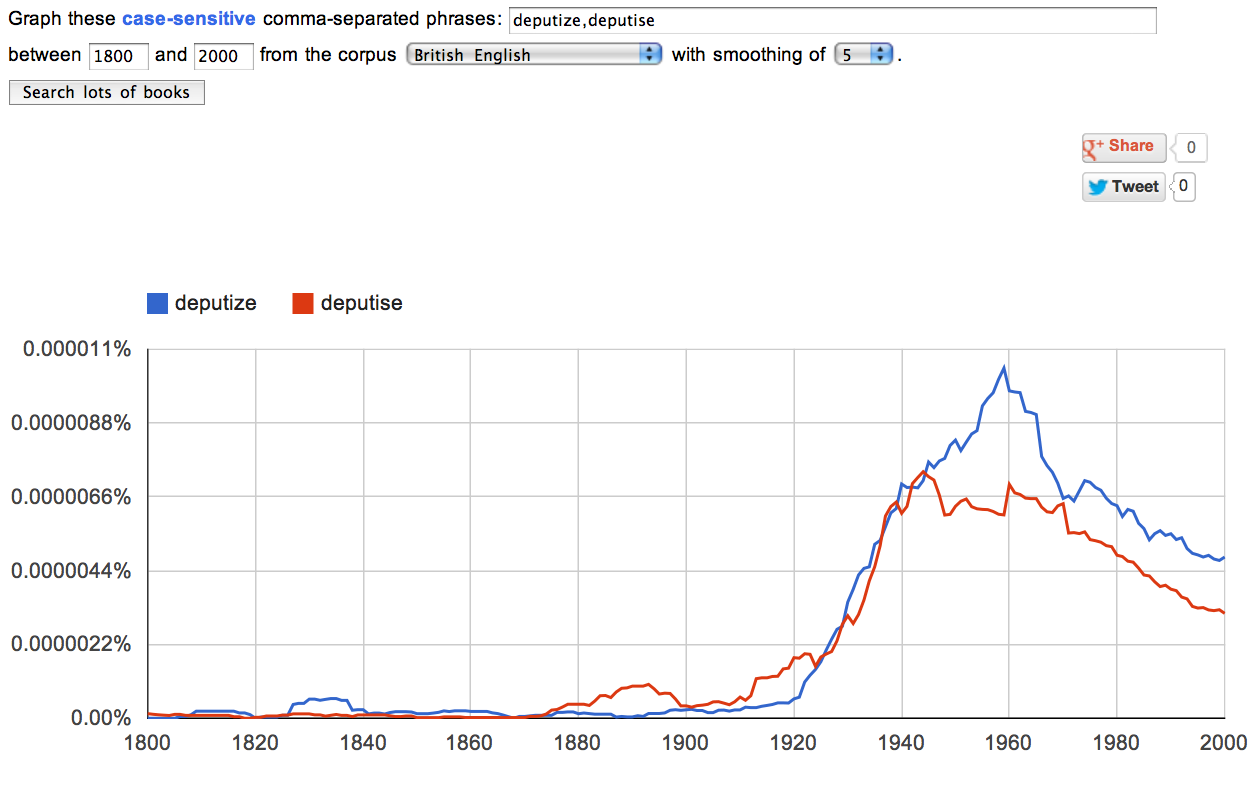
ameba vs amoeba
When did ameba supersede amoeba in American English? Answer: Never. Ngram
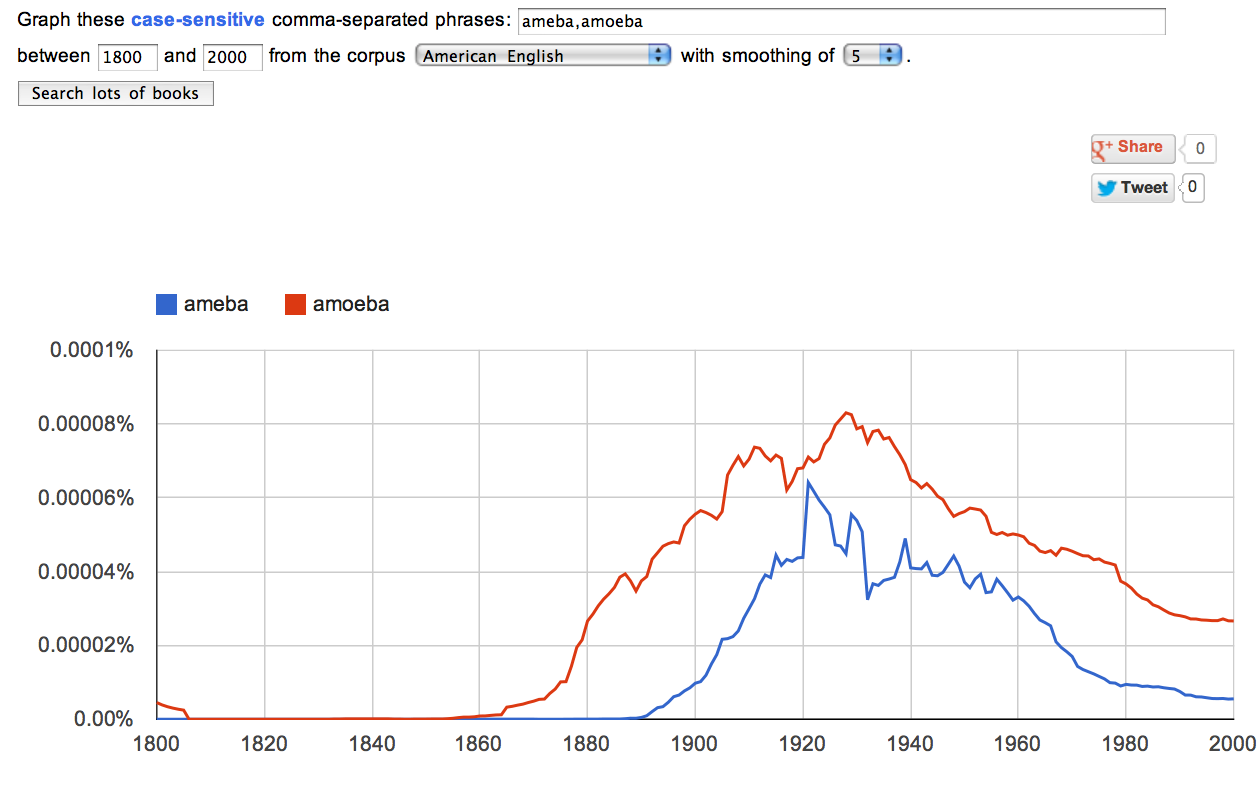
jewelry vs jewellery
When did jewelry supersede jewellery in American English? Answer: Around 1810. Ngram
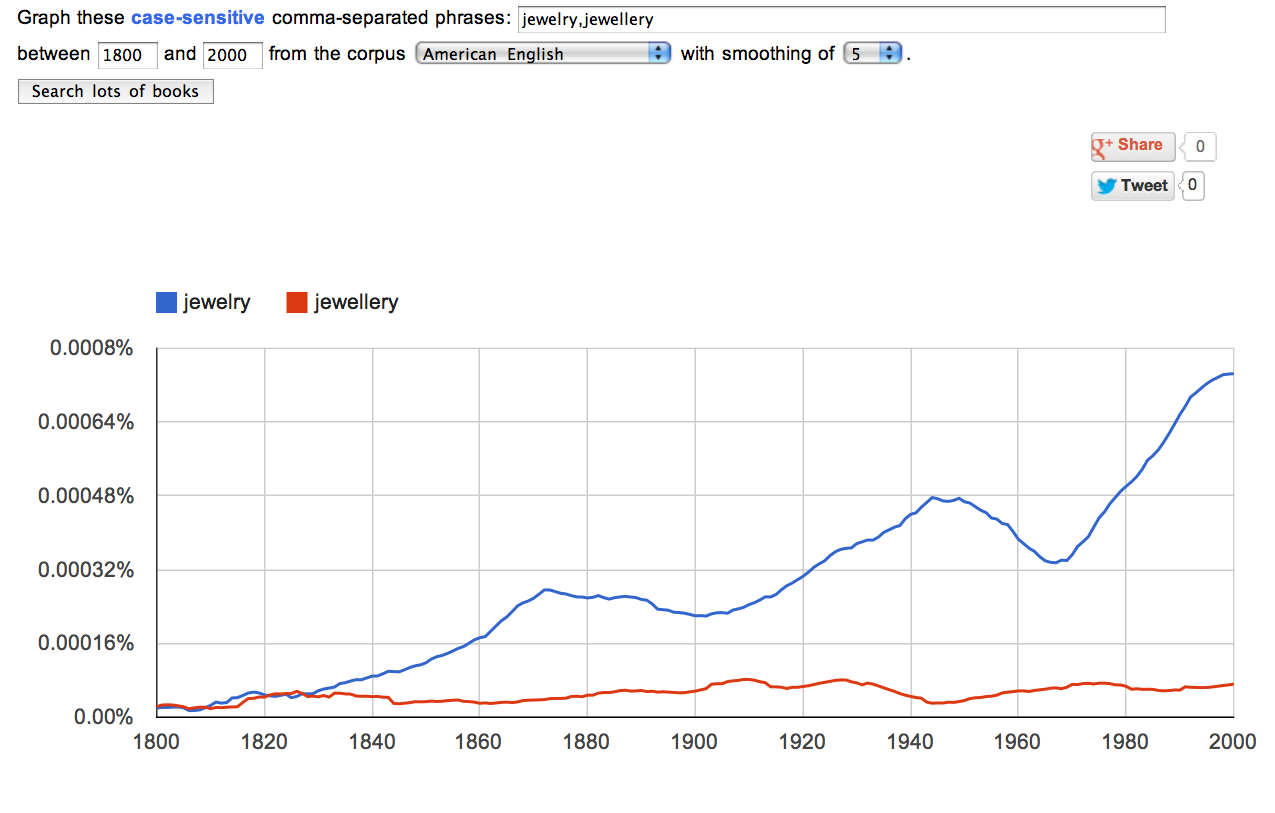
inflection vs inflexion
When did inflection supersede inflexion in American English? Answer: It probably never did, because it inflection was probably always the dominant spelling of that word in American publications. Ngram
The data from before 1800 is not of sufficiently high quality to use for drawing conclusions from.
But what about the other way around? When did inflexion supersede inflection in British English? Answer: Mostly never.
Or, depending on the quality of the data, perhaps around 1805. But if so, it only did so for 7 years, up through around 1812. There was a minor and short-lived blip in the early 1920s when inflexion seems to have edged out inflection again in British English for a couple years tops, and then again between 1948–1962. Since then, the inflexion spelling has been on wane in British publication such that by 2000 the inflection spelling dominated the inflexion spelling by a factor of more than 5:1. Ngram
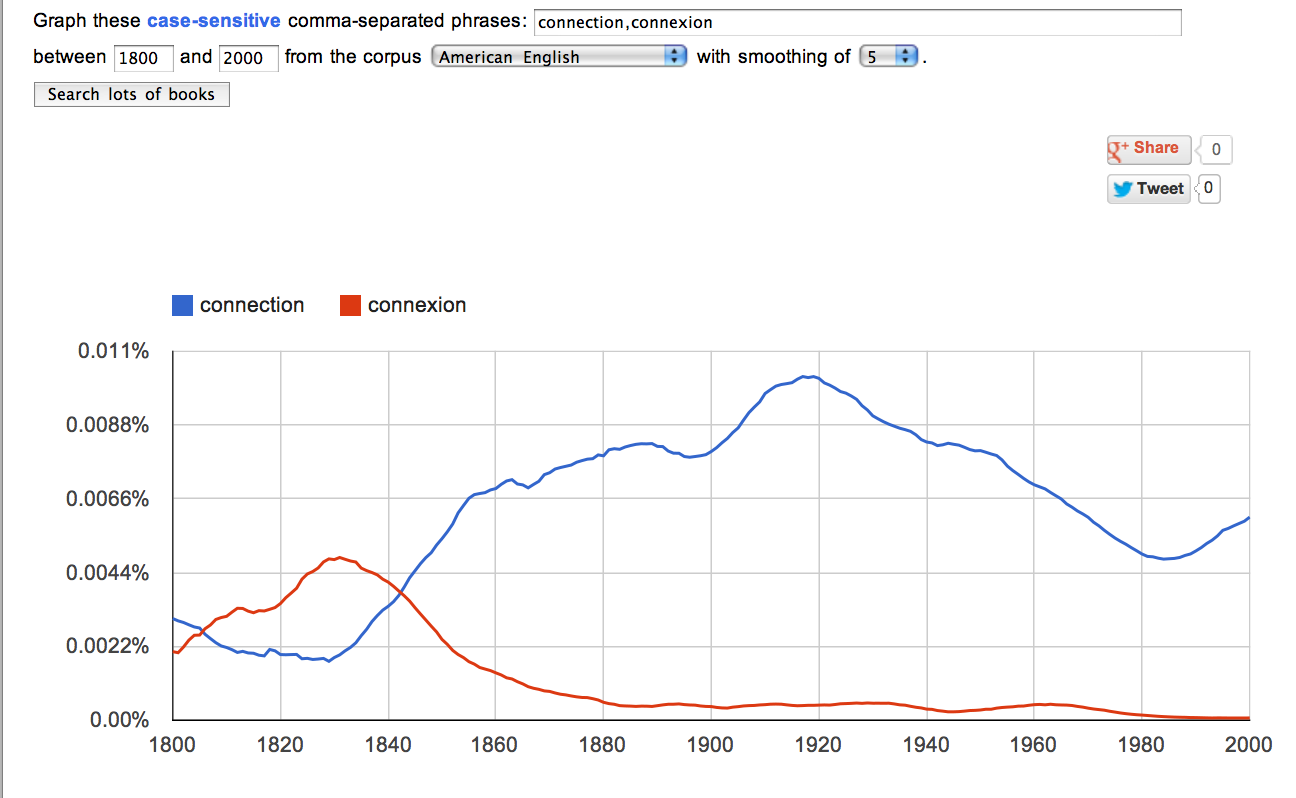
But what about the other way around? When did connexion supersede connection in British English? Answer: Around 1820. But it only did so for around 30 years, up through around 1850. Ngram
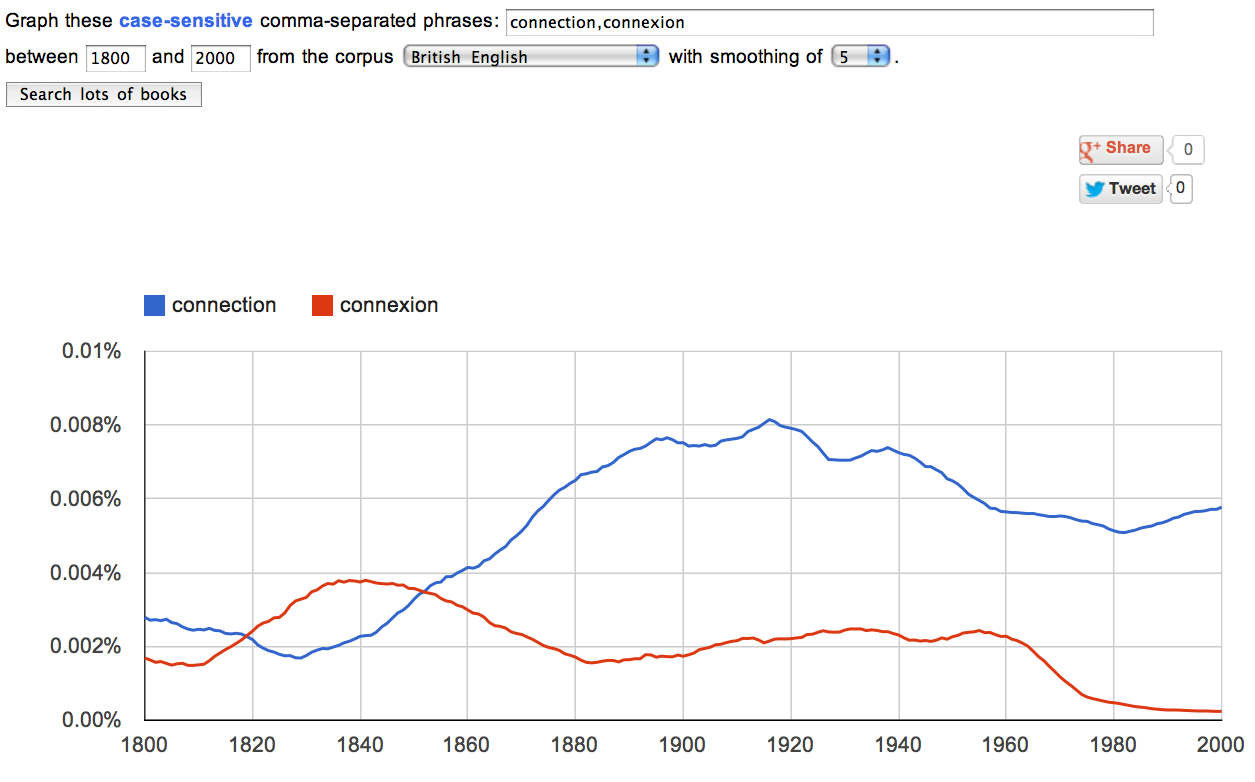
colored vs coloured
Since this one seems to be everybody’s favorite peeve, when did colored supersede coloured in American English? Answer: Around 1840. Ngram
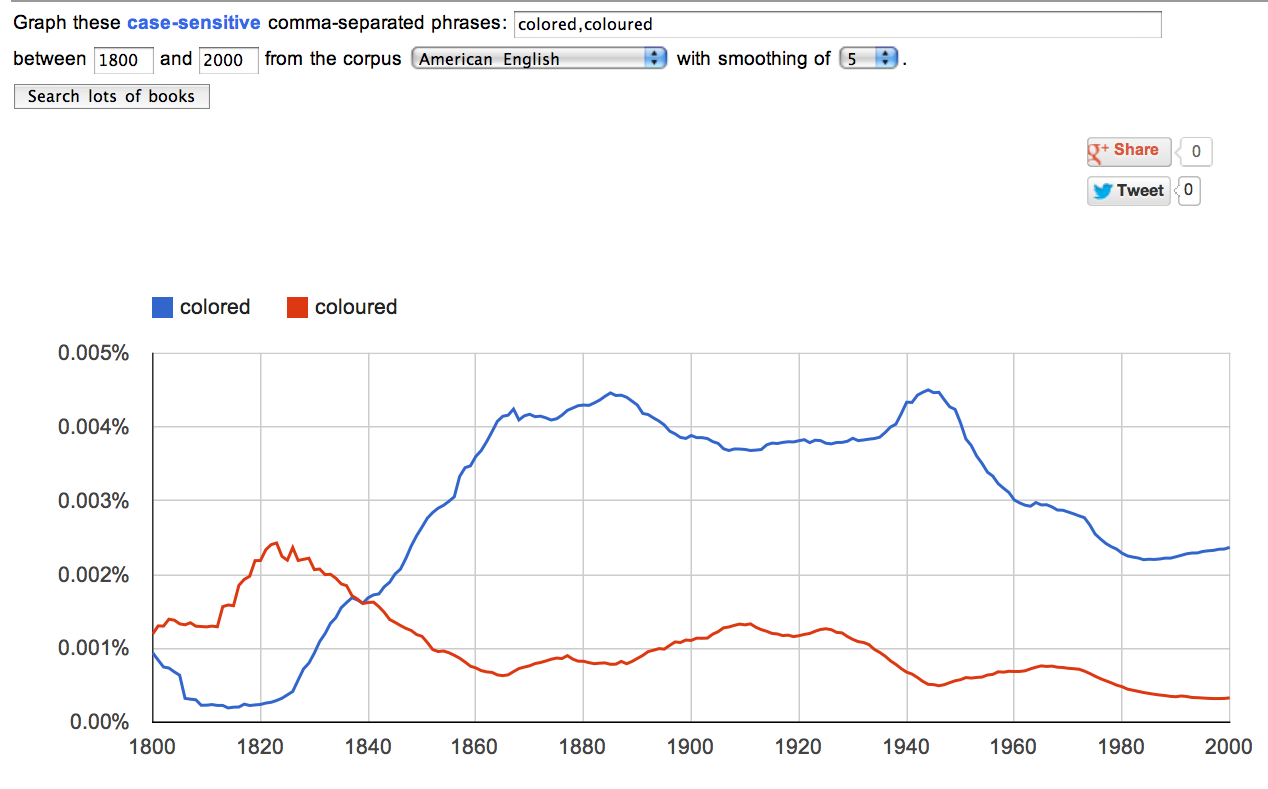
leveled vs levelled
When did leveled supersede levelled in American English? Answer: Around 1915. Ngram
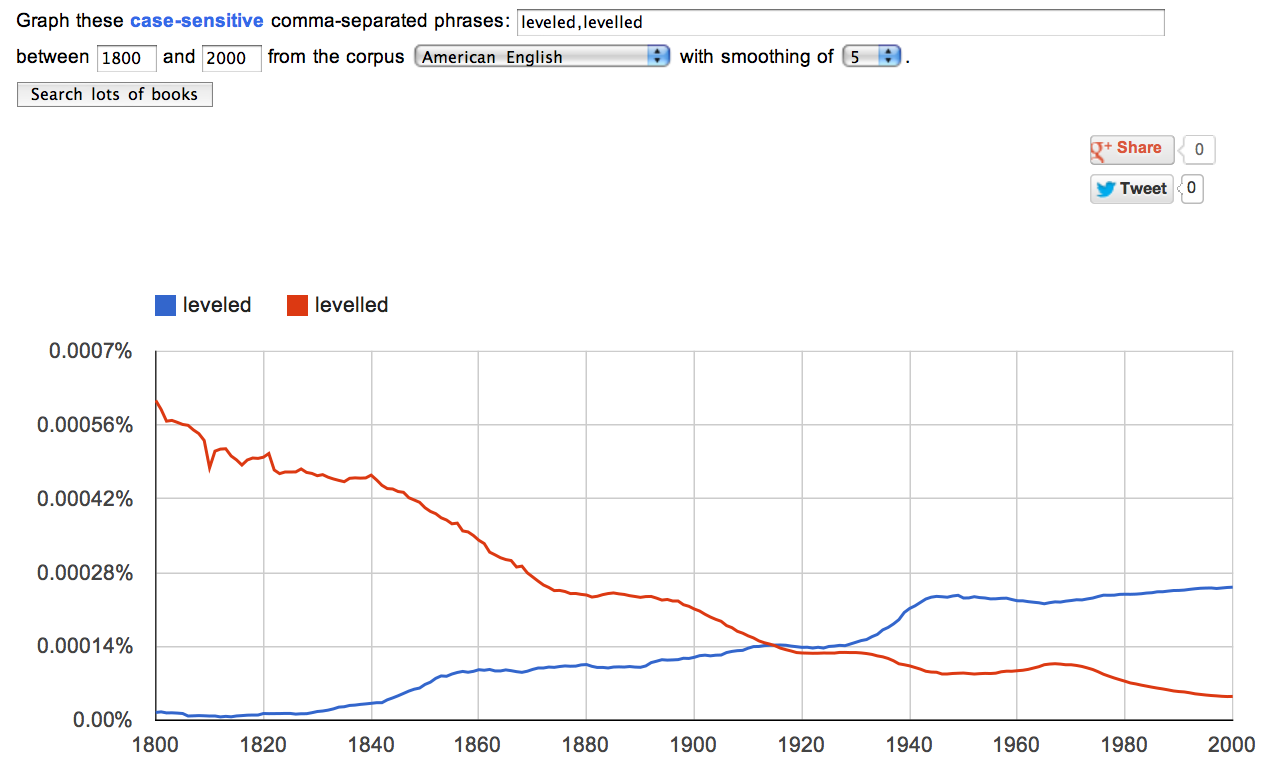
fetus vs foetus
When did fetus supersede foetus in American English? Answer: around 1910. Ngram
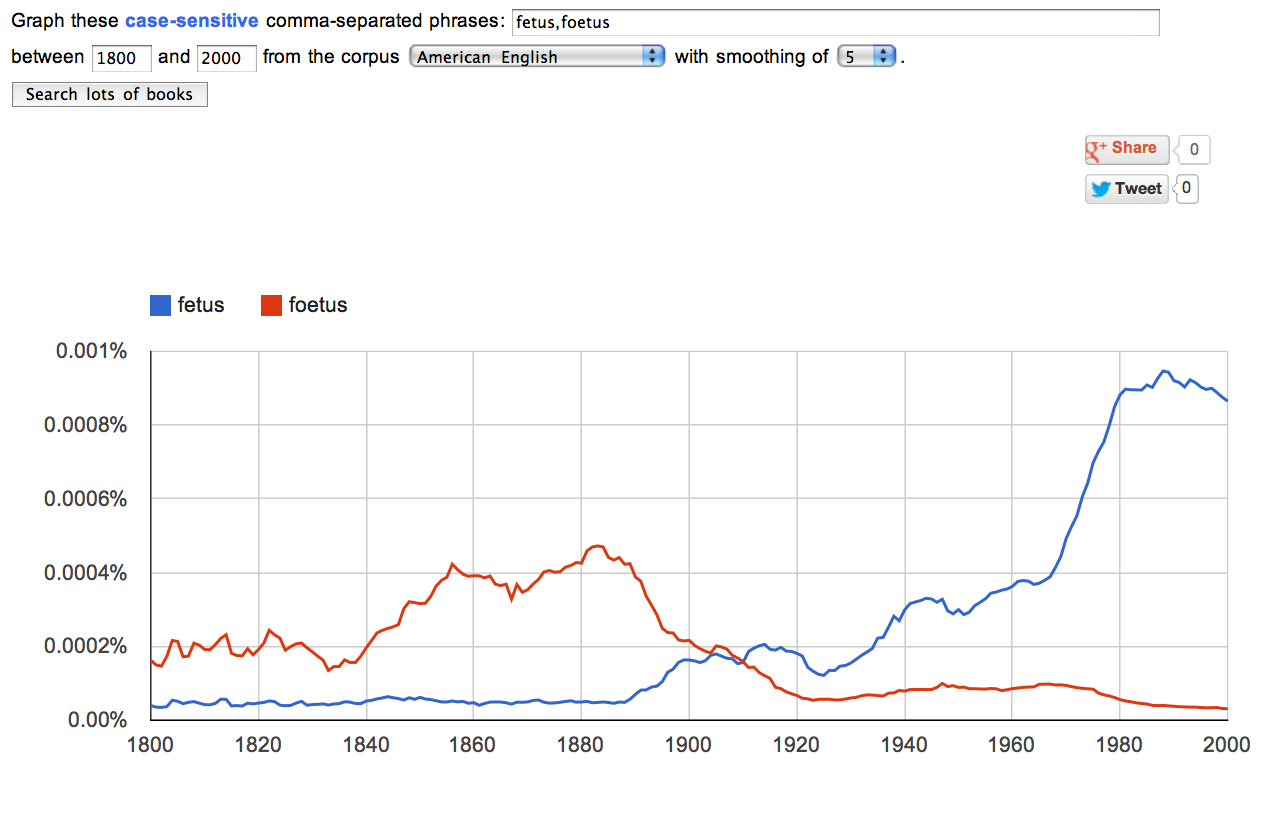
Hm, but what about the other way around? When did foetus supersede fetus in British English? It didn’t: it gave up the lead around 1970. Ngram
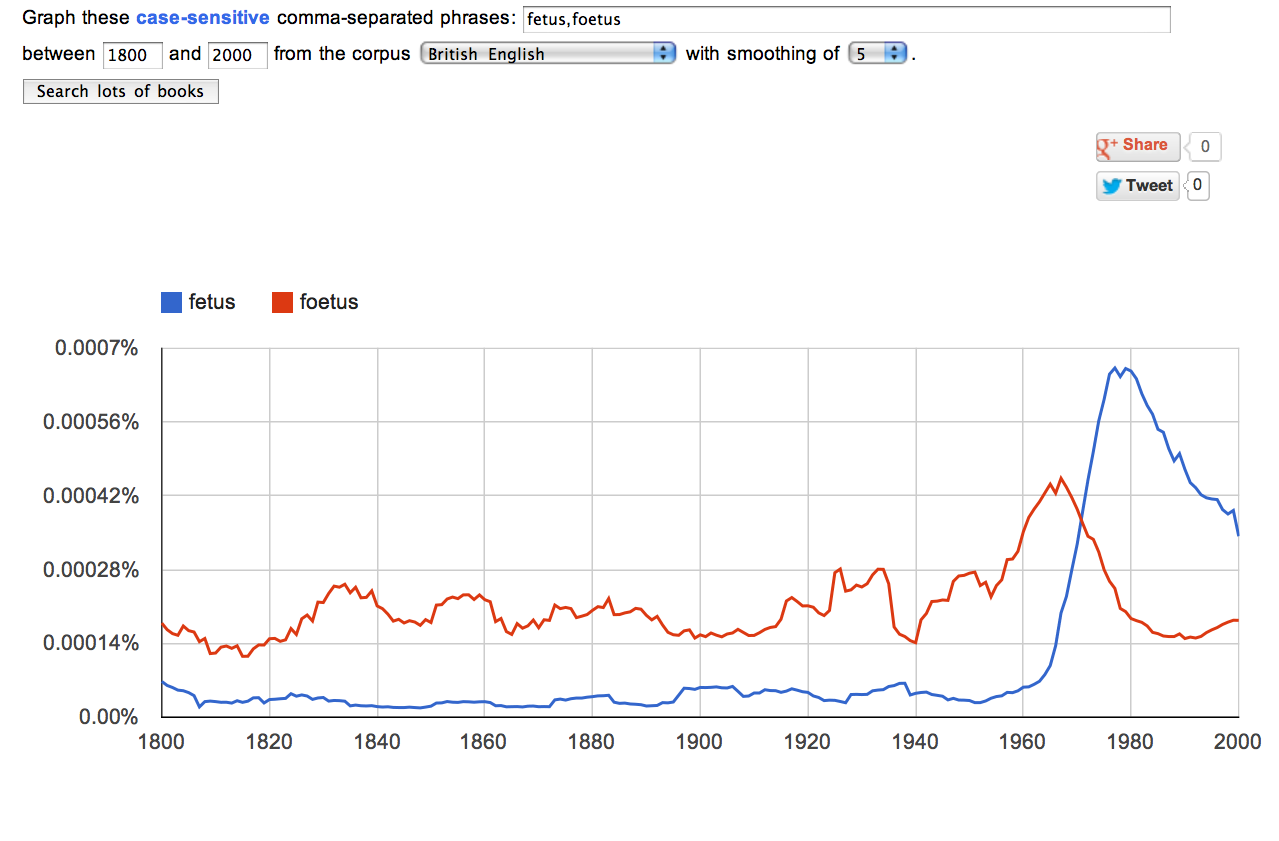
paralyzed vs paralysed
When did paralyzed supersede paralysed in American English? Answer: Always. ngram
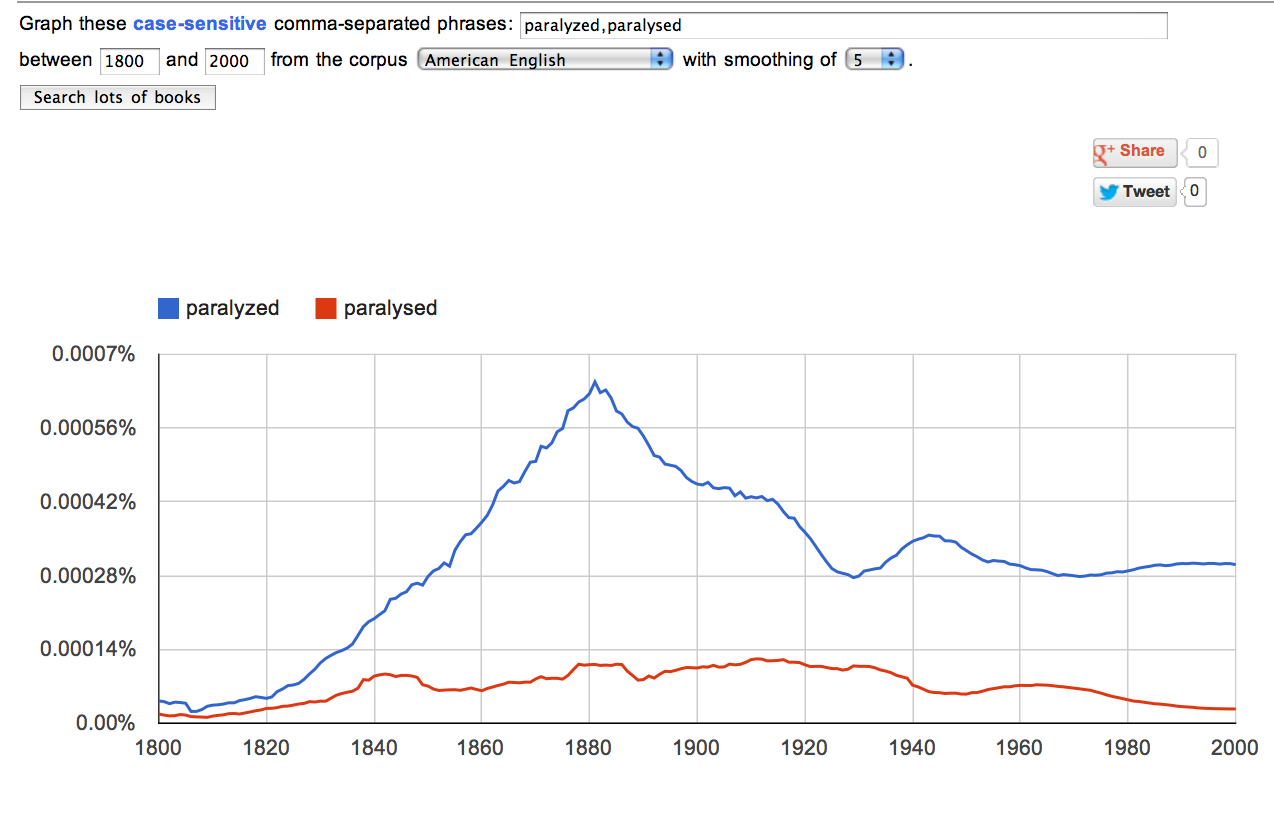
And the other way around: when did paralysed supersede paralyzed in British English? Answer, around 1830, but it has been losing a lot of ground recently. Ngram
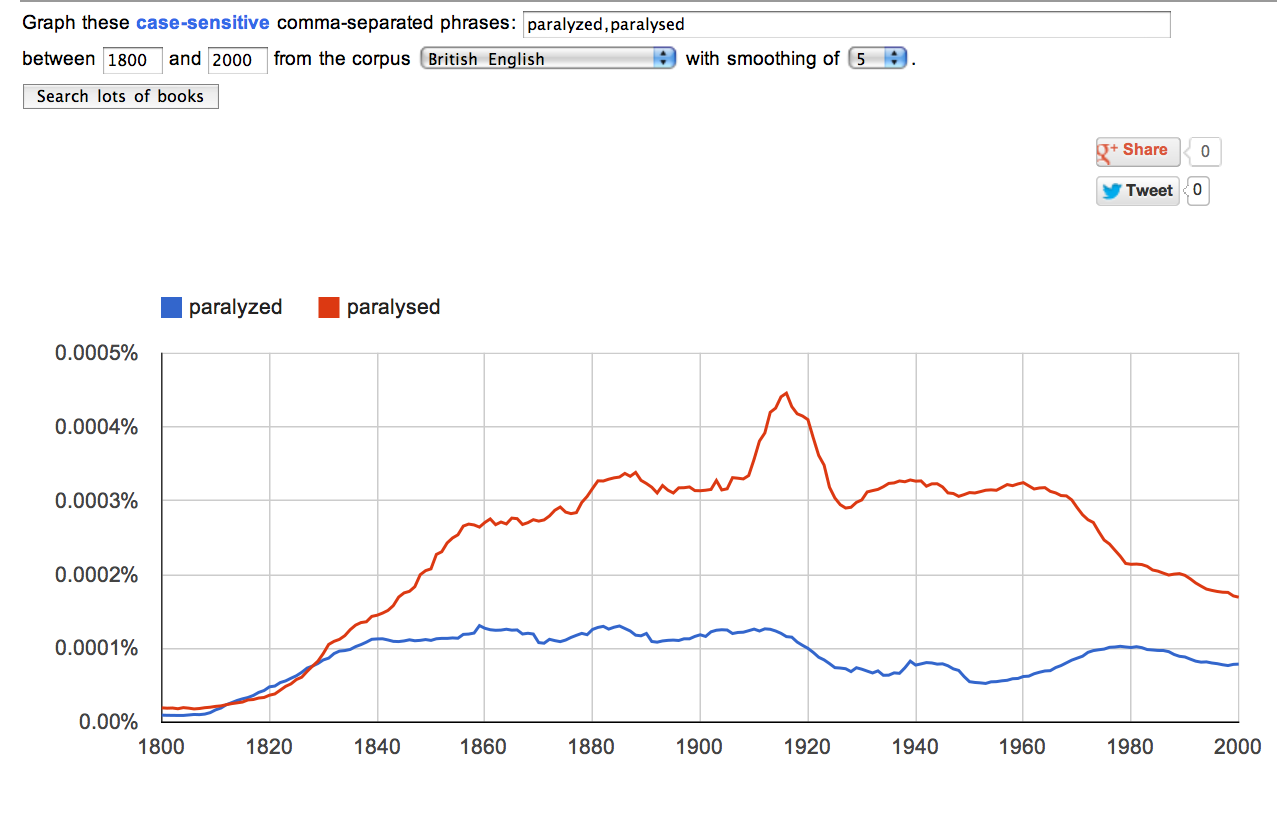
specter vs spectre
When did specter supersede spectre in American English? Answer: around 1940. Ngram
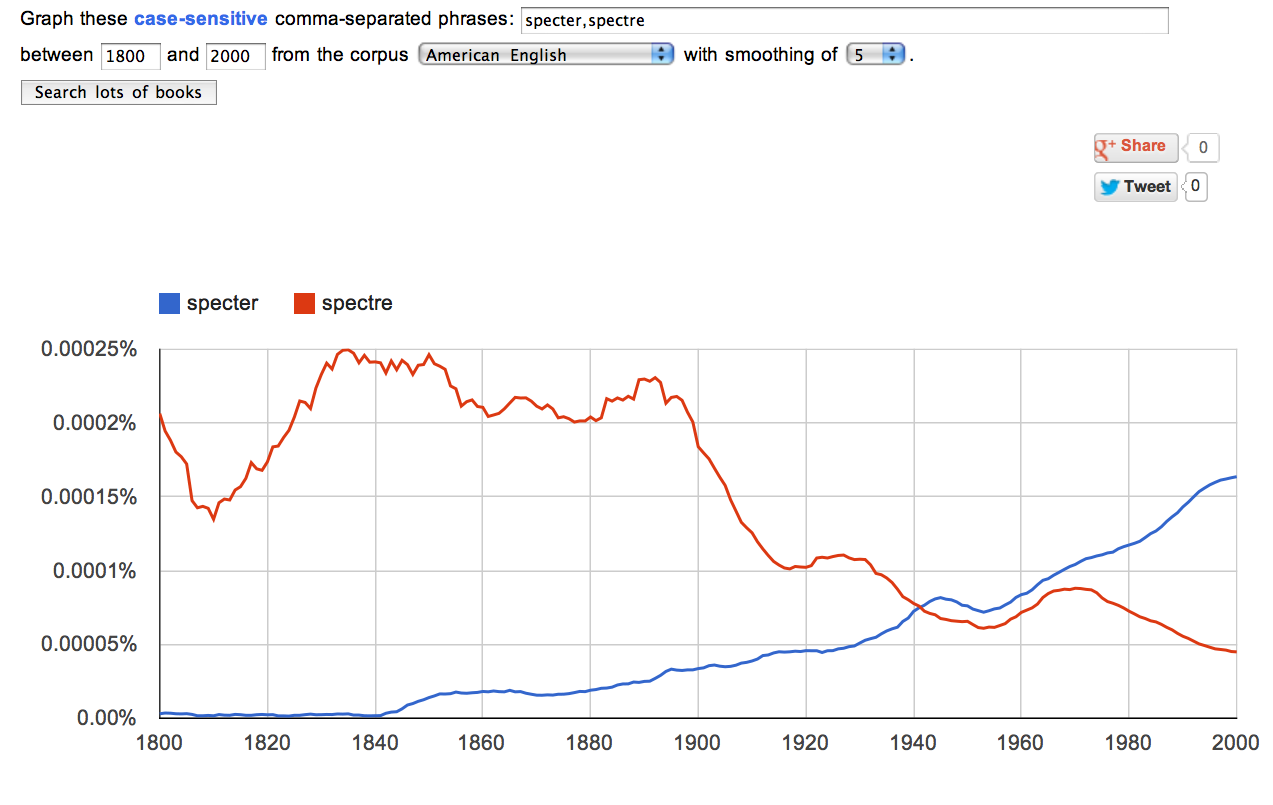
esophagus vs oesophagus
When did esophagus replace oesophagus in American English? Answer: Around 1910. Ngram

But what about British usage? The answer is that oesophagus seems to have lost to esophagus around 1980, but then may have returned. It’s hard to tell. Ngram

aluminum vs aluminium
When did aluminum supersede aluminium in American English? Answer: around 1900. Ngram
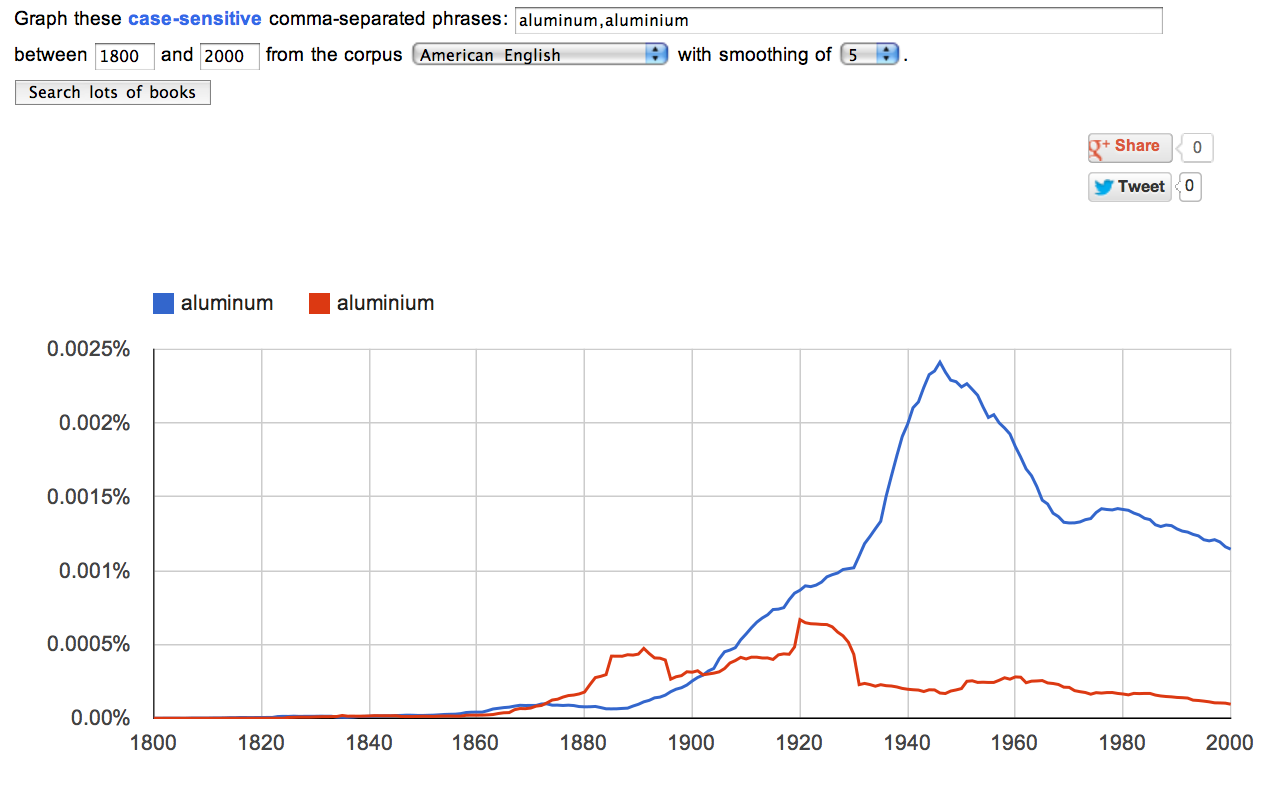
And what about the other way around? When did aluminium supersede aluminum in British English? Answer: around 1850, but it has lost a great deal of ground of late. Ngram

surprize vs surprise
It turns out that surprize was once the dominant form, not surprise, but this didn’t last even a hundred years. Ngram
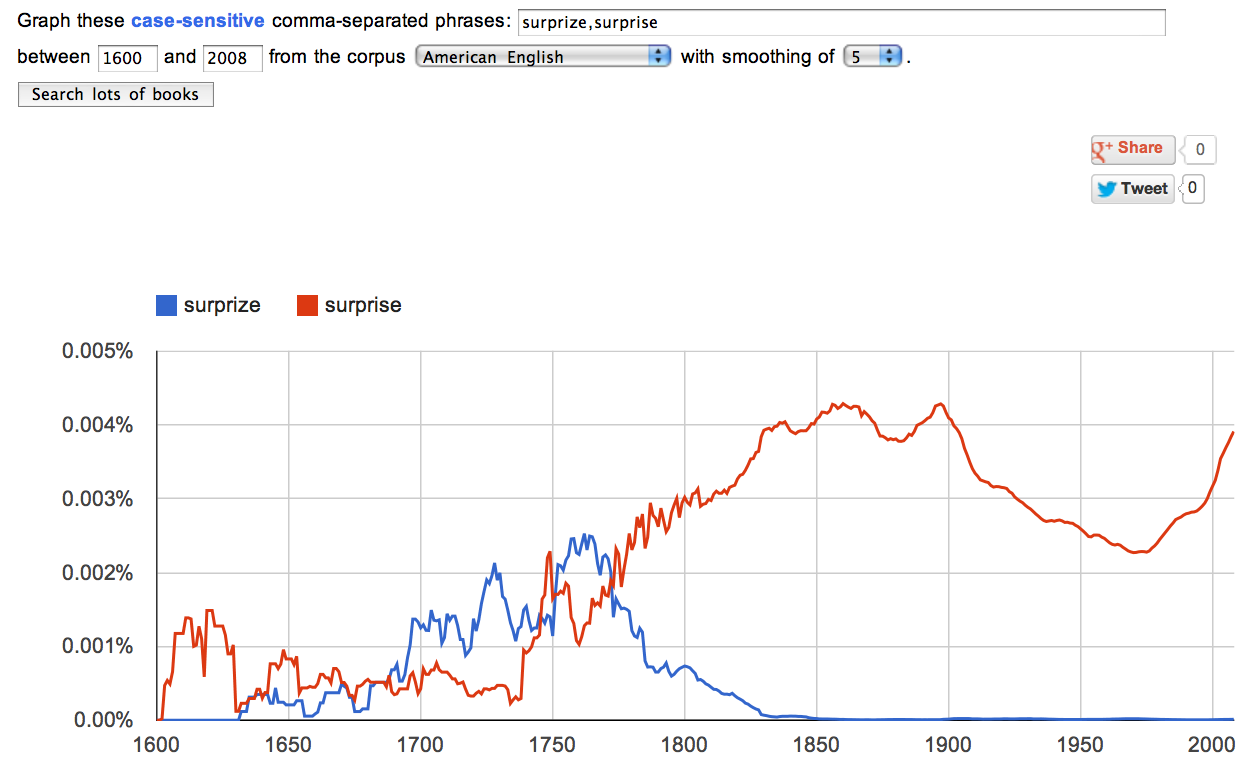
Then again, here is the British Ngram for the same pair. Notice that even the Brits used the z for a good while, possibly even for longer than in North America:
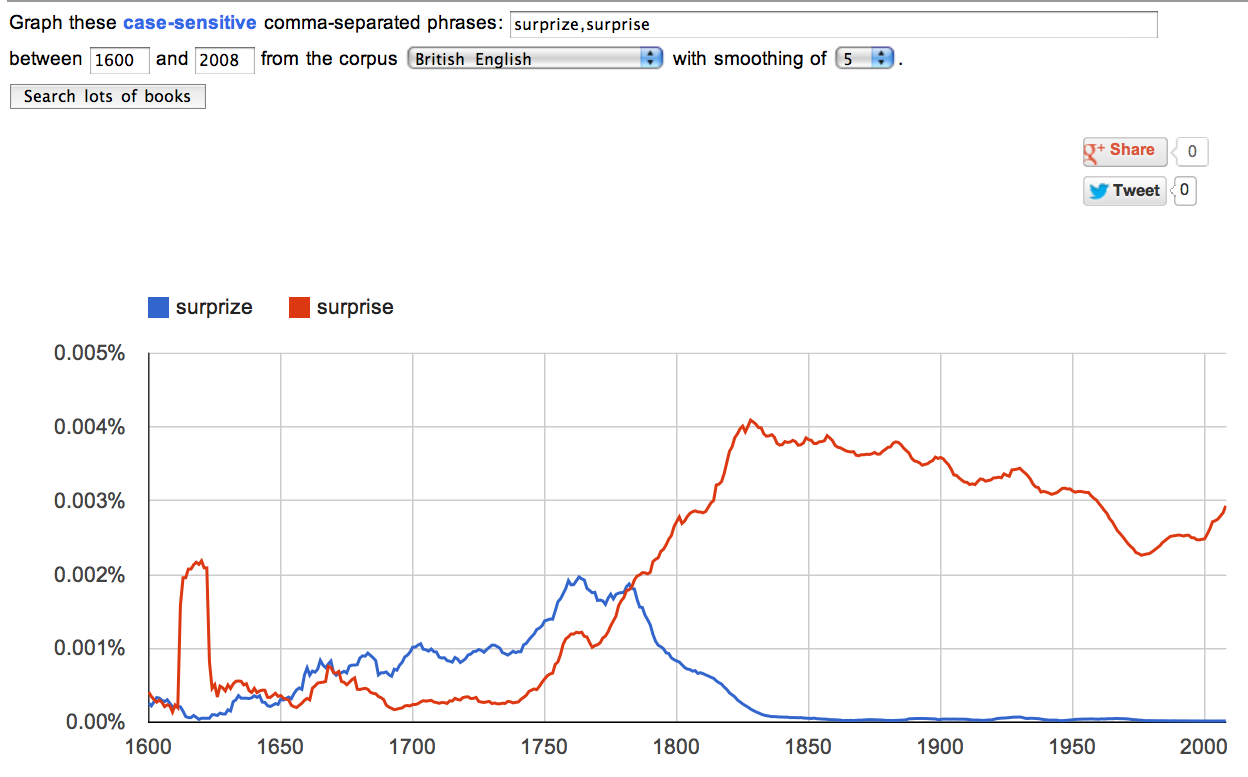
Summary
I hope you can now see why I said what I said: that there can be no clear answer here. Everything is different. You have to look at each word-pair separately, and you should make sure you aren’t wrong about Britain, either.
-
4Yet, if you look at the ngrams of "hackneyed stereotypes" such as colour, sceptic, flavour and rumour, their American spelling equivalents all take root after Webster's dictionaries were published and many of them supplant their British antecedents at roughly the same time. The fact that some words or changes have their own history does not belie the fact that there is an American standard or that there appears to have been a conscious push to adopt the advertised standard of the time. I'm not sure which of my assumptions you consider false; please explain. Commented Oct 24, 2012 at 18:24
-
4@tchrist: on the contrary, I think that is exactly the question being asked. The details might be wrong — that's why he's asking, after all — but there seems to have been a process by which American spelling diverged from British spelling. The presence of outliers, iconoclasts, and immigrants doesn't change this fact.– MarthaªCommented Oct 24, 2012 at 19:39
-
4The OP is certainly not the first to suggest that there are many words that Americans spell differently than Britons: this is generally taken as common knowledge and not some radical new theory. Are you seriously saying that this is not true? Yes, yes, you can find cases where an American used the British spelling and vice versa, but that hardly refutes the theory. (Just as it is true that men are generally taller than women, even though there are cases of women who are taller than the average man.) Indeed, the very fact that when I say, "An American used the British spelling of 'colour'" ...– JayCommented Oct 24, 2012 at 20:54
-
11Tire in Britain is almost always related to weariness: cars have tyres. I don't think that weakens your answer (with which I largely agree), but it does weaken the belief that Ngrams are helpful in such cases. Commented Dec 25, 2012 at 17:03
-
4@TimLymington You can append
_NOUNto restrict by part of speech: tires vs tyres (noun)– oalsCommented Jul 19, 2016 at 17:52
While the progress of English spelling reform (which is apparently the term of choice) in the United States generally appears to have been gradual and chaotic, three major periods of change through deliberate process seem to be its primary drivers.
Webster's first dictionary, A Compendious Dictionary of the English Language, was published in 1806. He then spent twenty years revising it to produce the first American Dictionary of the English Language (ADEL) which was published in 1828. An expanded and revised second edition appeared in 1841. Although it drew some protest, the reformed spellings were gradually adopted throughout the United States.
In A History of English Spelling, D.G. Scragg writes:
"But some remained, and since the book was successful in establishing its authority throughout the States, they have become generally recognized as American forms. In that sense Webster was the first to differentiate between British and American usage, and in that it was frequently he who chose the variant of two spellings in early nineteenth-century use which have subsequently been preferred in the United States, he can be said to have influenced the development of spelling. He is in a way 'responsible' for such forms as center, color and defense."
While Webster championed a number of spelling reforms, only a few were widely adopted.
The release and adoption of the ADEL editions certainly corroborates with a number of ngrams which show the new American spelling steadily becoming popular after the 1820s and eventually becoming more dominant on or after 1845. For example,
- 1841: parlor > parlour
- 1846: color > colour
- 1845: rumor > rumour
- 1846: honor > honour
- 1843: connection > connexion
- 1844: recognize > recognise
There are a number of other similar instances. There are also examples such as fraternize vs. fraternise where the former, while already (in terms of the ngram) maintaining a small lead in preference, takes a sudden leap after ~1835.
As mentioned earlier, only a few of Webster's reforms, of which many were contentious, were adopted. After his death, the more egregious of his changes were gradually dropped by subsequent editors. In the 1870s, the American Spelling Reform Association was formed. They, along with the American Philological Society and the American Philological Association worked further on simplifying (American) English spelling.
That year, the American Philological Society adopted a list of eleven reformed spellings for immediate use. These were: are→ar, give→giv, have→hav, live→liv, though→tho, through→thru, guard→gard, catalogue→catalog, (in)definite→(in)definit, wished→wisht. One major American newspaper that begun using reformed spellings was the Chicago Tribune, whose editor and owner, Joseph Medill, sat on the Council of the Spelling Reform Association. In 1883, the American Philological Society and American Philological Association worked together to produce 24 spelling reform rules, which were published that year. In 1898, the American National Education Association adopted its own list of 12 words to be used in all writings. These were: tho, altho, thoro, thorofare, thru, thruout, catalog, decalog, demagog, pedagog, prolog, program.
We can see the effect of these reforms via a couple of ngrams:
- > 1880: thru
- > 1880: demagog, decalog, prolog, epilog, pedagog
1906 saw the formation of the American Spelling Board which was funded by Andrew Carnegie. They published a list of 300 words which were adopted by President Roosevelt for government use.
Roosevelt tried to force the federal government to adopt the system, sending an order to the Public Printer to use the system in all public federal documents. The order was obeyed; among the many documents printed using the system was the President's special message regarding the Panama Canal.
However, in December 1906 the U.S. Congress passed a resolution and the old spellings were reintroduced. Nevertheless, some of the spellings survived and are commonly used in American English today, such as anaemia/anæmia→anemia and mould→mold. Others such as mixed→mixt and scythe→sithe did not survive.
The effect of these reforms can be seen in the following ngrams:
- 1906: center > centre
- 1912: defense > defence
- 1912: offense > offence
- 1910: anemia > anaemia
- 1913: hydrolyze > hydrolyse
- 1912: kilometer > kilometre
To summarise, the divergence of American spelling is the result of spelling reforms initiated by Webster, taken further by interested parties including at least one media house, and eventually, the (temporary) backing of the US government. However, only a small percentage of each set of proposed reforms were adopted at any one time. The more drastic of reforms met with stiff resistance:
Roosevelt ultimately decided to rescind the order. Brander Matthews, a friend of Roosevelt and one of the chief advocates of the reform as chairman of the Simplified Spelling Board, remonstrated with him for abandoning the effort. Roosevelt replied on December 16, 1906: "I could not by fighting have kept the new spelling in, and it was evidently worse than useless to go into an undignified contest when I was beaten. Do you know that the one word as to which I thought the new spelling was wrong — thru — was more responsible than anything else for our discomfiture?" Next summer Roosevelt was watching a naval review when a press boat marked "Pres Bot" chugged ostentatiously by. The President waved and laughed with delight.
One needs to understand that a lot of this has to do with the advancing tide of universal public education in the US. Some public schools were developed in the mid to late 1700s (Benjamin Franklin had a hand in starting one), but the movement really gained steam in the early 1800s. (Horace Mann was a well-known advocate, and, as a result, has nearly as many schools named after him as Washington or Lincoln.) Education came to be seen as not only a legitimate concern of state and local governments, but in many cases one of the most important aspects.
The resulting explosion in public schools, especially at the elementary level, was so vast (as was the westward migration of the population) that most school teachers had an eighth-grade education, often considerably less. As a result they relied on what was essentially a prescriptivist approach of teaching spelling and pronunciation from a relatively small number of texts, with Webster's dictionary being a major contributor.
Simultaneously, students from many backgrounds, many knowing no English at all (their parents having recently emigrated from Norway or Italy or Germany, for example), were thrown into these schools. Parents, teachers, and the general public saw this as an opportunity to teach children the "right" way to speak English, and so the teachers were even more motivated to rely on Webster's dictionary to achieve a "universal" result.
Certainly this progress was "chaotic" (universal primary education took a full century to spread across the whole country, for example), but the progress was steady and strongly motivated. (The "motivation" occurred at all levels — local, state, and federal. While no one loved taxes even back then, most people saw the merits of public education and were, for the most part, willing to contribute their fair share.)
But the result of this is that Americans, in spite of their diverse backgrounds and the wide distances between many population centers, speak/spell a relatively standardized language. This is especially the case when one gets away from the East Coast (whose populations predate the universal education movement).
-
3Also regarding public education, I believe something should be said about budgets. One of the reasons Webster's dictionary became particularly popular is since after shortly after Merriam Co. took over, they significantly reduced the price just to increase sales. In 1847 they lowered the price from $15 to $6, making it very affordable to schools, which alongside some critical acclaim among senators and presidents, led New York and Massachusetts to buy many copies for their schools. At least, that's gist of the story as Merriam-Webster tells it.– TonepoetCommented Jul 22, 2015 at 23:49
Oesophagus has always been spelt that way in Britain. If spelt correctly, Tyre and tire are two entirely different words, as has already been pointed out. I have never seen foetus spelt as fetus in the UK. Paralysed is always the correct spelling here and aluminium is always aluminium.
I am a bit puzzled about where some of the data on 'British English' is coming from, as it is very suspect.
-
3This is interesting extra information about instances of British spelling, but does not address the OP's question and would be better as a comment there.– MitchCommented Jul 25, 2015 at 14:53
-
Don't forget the original spelling was aluminum and BrE inserted the 'i' later. Commented Aug 5, 2023 at 7:01
-
My shooting-from-the-hip hypothesis is that the corpus of supposedly British English is skewed by the fact that it is taken from prominent print sources, and prominent print sources are more likely to try to use spelling that they believe will accommodate the widest possible audience. Thus it may in fact be a corpus of semi-"international" English. The way British people naturally write on a daily basis when not filtered by editors and those with a market-driven agenda—which the corpus most likely does not include—would be much more useful data to have. Commented Jan 10 at 23:13

